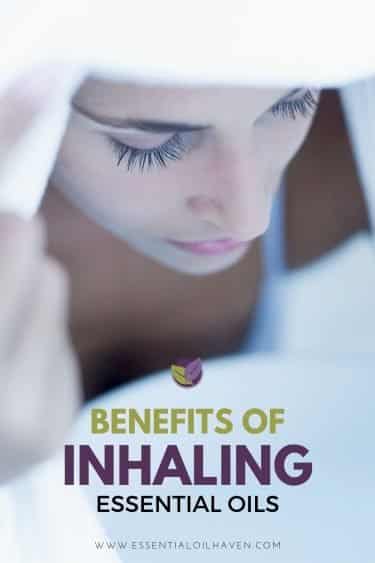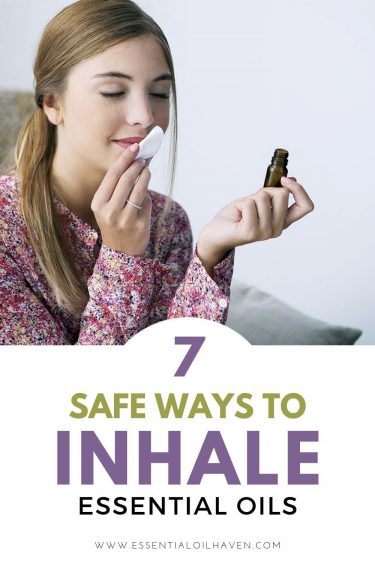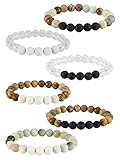
I don’t know about you… but when I open a bottle of oil for whatever use or recipe, I always take a little smell. I put the bottle under my nose, and for a quick second, I do nothing else but to enjoy that particular essential oils’ scent.
It helps me focus on what I’m about to go use the oil for.
This post contains affiliate links, which means if you make a purchase through these links, I may receive a small commission at no extra cost to you. Read my full disclosure policy here.
And it’s that first whiff of bliss that we can use as the main purpose of aromatherapy application.
Aromatherapists and natural medicine practitioners use essential oils to treat various ailments. The way to get the aromatic oils into our body is either by inhaling the oil, topical application (massage), or ingestion.
Is it safe to inhale essential oils from a diffuser? When is it bad to inhale oils? In this article, we are reviewing the practice, safety precautions and side effects of inhaling essential oils.
Benefits of Inhaling Essential Oils
Essential oils are extracted from plants through steam distillation and cold pressing. Inhaling essential oils is beneficial to health in many ways ¹:
- Promote Comfortable Sleep and Relaxation: Anxiety, stress, and depression can be treated holistically using essential oils. Aromatherapy oils can help to relieve psychological disorders and stimulate good signals to your brain. This will help you wind down in the evening and enjoy a more restful sleep.
- Reduce Inflammation and Irritation: Essential oils can help in reducing inflammation and irritation. Many oils contain anti-inflammatory substances. They can handle inflammation of the throat, sinuses, and inhibit respiratory inflammation.
- Pain Relief: Relieve headaches, migraines, and tensions by inhaling essential oils. The fragrances from these oils get into the brain within just a few seconds. This will help to lessen pains and discomfort in the body.
- Fill your Home with Desirable and Uplifting Fragrances: Fill your home with desirable and uplifting fragrances by diffusing essential oils. Incense and candles can put your household at risk. Using a diffuser is safer and better.
- Boost Immunity and Inhibit Some Ailments: Essential oils are absorbed into the bloodstream. This happens if they enter the lungs after breathing in through the nostrils. The therapeutic essences of some essential oils can boost your immunity and prevent some ailments.
- Enhance your Mood: Inhaling fragrances from essential oils can help improve your mood. The scent triggers wonderful stimuli in your brain. This makes you respond emotionally to appealing aromas. Essential oils can make you positive, vigorous, and confident after breathing in the perfume. Use in a diffuser or hot bath for effectiveness in the body.
7 Safe Ways to Inhale Essential Oils
Essential oils can be inhaled safely through the following methods:

- By evaporation using tissue or cotton round. Add some drops of your favorite essential oils onto a tissue or cotton ball. Place on a table, desk, computer, or bedside. Allow the oil to evaporate into the air as long as you want. You can also place the cotton round under your pillow or bedding at night. This can help you continue inhaling therapeutic fragrances throughout the night while you are asleep.
- Using in a diffuser. Add essential oils with water to your diffuser and allow to evaporate. Add 6-8 drops of essential oils. You can blend two or more oils as desired for better effects. Your home will be filled completely with great fragrances after a few minutes. If you are a yogi, add some drops of lavender oil to enhance relaxation during your sessions.
- Spraying into the air. Deodorize your room and surroundings using DIY essential oil room sprays. To spray essential oils into the air, mix the oil in water, shake the solution, and spray around your home. Use distilled water if you can, and add alcohol to make your spray and aroma last longer.
- Through bathwater. Using essential oils in bathwater promotes inhalation as well as topical absorption. The oils will be inhaled, but can also be absorbed through the skin, so please ensure to not add more than 2-3 drops to your full tub to avoid skin irritations.
- Use steaming water. You can inhale essential oils by using hot steam. Add essential oils to a bowl of hot water. Cover your head with a towel and place your face over the steam from the bowl. Inhale for 5-10 minutes. It’s ok to take a break if your face gets too hot. Continue the process until you experience relief. This is a beautiful spa-like aromatherapy experience – as if you were in a sauna.
- Aromatherapy beads or inhalation beads: This is a portable option that you can use wherever you are. Use an essential oil bracelet with lava stone beads or other natural stone beads such as this one here.
- Use a personal inhaler. Essential oil inhalers are basically sticks of wick, soaked in oils, that you can carry with you for use whenever needed. The basic personal inhalers are white and boring looking, but if you choose some prettily colored ones like these ones here, the process becomes a lot more fun! Carry your personal essential oil inhaler in your purse, car, or diaper bag. Take a sniff whenever you need rapid relief.
Side Effects and Precautions of Essential Oil Inhalation
Inhaling essential oils has been proven to be beneficial in many ways. Yet, the side effects of inhaling essential oils include 2:
- Essential oils could be poisonous to your pets such as cats. If you use a diffuser at home, please read more about safely diffusing around your cats.
- Essential oils could interact with traditional medicines or prescriptions. Please always read up on all of the possible interactions of any essential oil with any pre-existing medical condition you may have, or any medication you are on. Check with your doctor to ensure no contraindications are present.
- Excessive usage of some essential oils can cause irritations. Mostly, this concern is about skin irritations due to a too highly concentrated application of essential oils. But if you notice scratching in your throat, or other discomfort of the airways, discontinue use immediately and check in with your health care practitioner.
If in doubt, you can always consult a Certified Aromatherapist in your area for individual guidance and recommendations.
References
- 7 Healthy Benefits of Essential Oils (and why they matter) https://www.developgoodhabits.com/benefits-natural-essential-oils/
- Essential Oils Promise Help, But Beware the Risks https://www.webmd.com/beauty/news/20180813/essential-oils-promise-help-but-beware-the-risks
- Common and Dangerous Essential Oil Mistakes http://info.achs.edu/blog/aromatherapy-essential-oil-dangers-and-safety




Leave a Reply